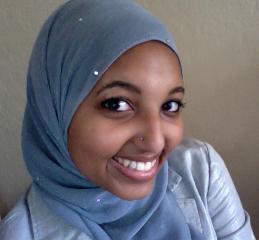Wearing Hijab & Being An American Muslim
 By Nesima Aberra journalism student.
By Nesima Aberra journalism student.
When I pondered wearing the hijab the summer before my freshman year of college, I thought a lot about what it meant for me to be an American Muslim.
I felt I would be almost betraying everyone I knew with this new addition to my persona, and I didn’t know how people would react.
I suppose what troubled me most was feeling that I would be perceived as an extremely traditional, foreign Muslim girl, not an American-born one. I was afraid I would no longer fit in, and everywhere I went I’d be reminded of how different I looked.
I felt that all the time I had spent building my identity would be wasted now that I was reintroducing myself to the world as something people already had an opinion about. I’d be simply a walking, talking, religious/political symbol, not a member of American society. My modest decision might be seen a brazen attack on “traditional American values.”
I felt the urge to be a “public ambassador” for my faith because the only Muslims people were familiar with were terrorists and rich oil sheikhs on TV. “Where are all the moderate Muslims?”, they were asking.
I don’t like the term “moderate Muslim” because it implies that those who are moderately religious are good, and all others are not. What many people don’t understand is that being Muslim, by definition, means you should be a moderate, balanced person. That’s what our religion teaches us.
When American Muslims try to speak out, they are dismissed and labeled as biased or insincere; they may even be suspected of terrorist allegiances. Defenders of Muslim rights are ostracized as Islamist apologists. New or expanding mosques are called terrorist breeding grounds trying to bring Sharia law into the country.
After putting on the hijab, I expected to feel some sort of shift in perspective or magical rearrangement in the universe, because I was doing something worthwhile and making a difference. I wanted questions. I wanted confrontation. I wanted encounters that would inspire and motivate people.
In reality, all that had happened was that one girl decided to cover her hair, and nobody blinked. The people who were talking about people like me weren’t around me, they weren’t talking about me or listening to me, and I couldn’t do anything about it. They were on TV, writing books and blogs and I was a nobody.
It’s a difficult, self-conscious journey to stand up for your faith and have to deal with all this baggage, so it’s not surprising that most people want to avoid it and just keep calm and carry on. So what do we do? Just change the channel, don’t buy that book, ignore that talking head and it’ll all be over, because, hey, the media is always going to be against Muslims and there’s nothing that can be done about it?
I believe the media has the ability to be used for good, for truth, for accuracy and for tolerance. That’s what inspired me to go into journalism - to raise awareness of the multitude of voices all striving to contribute and benefit humanity.
I have faith that the more society is educated about Muslims, the better our future will be. One day, growing up Muslim won’t be an agonizing, soul-searching experience. It’ll be an ordinary, respectable path just like anyone else’s. It will simply be another path to happiness and purposeful living.
I’ve been blessed with friends, family, classmates, teachers and more who have supported, encouraged and appreciated me throughout my childhood. I was raised to be a proud American and, head covered or not. I still am one. Everyone who has met me after I began wearing the hijab has been kind, normal and respectful, which is truly telling in a time when we often expect less than civility from one another.
Nesima Aberra is a sophomore journalism student minoring in global studies at Arizona State University. She loves volunteering, creative writing, cooking, filmmaking and reading. She’s a hippie dreamer but also a pragmatic realist, which makes for an interesting perspective on the world. You can find her at these links: Young and Writerly, Conflicted Voices, Twitter: @NesimaAberra. The opinions expressed in the post are those of the author, and not necessarily mine or those of Amazing Woman Rock.
Related Articles
- Is There a Terrorist Under That Hijab?
- Kickass Canadian Muslim Women Challenge Stereotypes With Calendar
- Her Unique Face: A Poem By Shemiza Rashid
- Hijabistas Are Islam's Fashionistas
- In My Bubble: Natasha Moloo Draws Her Jihad
- You Don't Have To Be Muslim To Wear #PINK Hijab
- Make The World A Better Place.
- Hijab Girls (And More) By Cory Eldridge